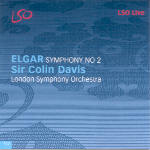When Colin Davis is on form, he’s as engaging, exciting, and convincing as any conductor living or dead. He’s in top shape here, and so is the LSO. Unlike his glum and tormented account of the First Symphony, he turns in one of the freshest, most optimistic sounding interpretations of the Second in many a moon. Although the overall timing (57’38”) looks to be a bit on the slow side, the performance lingers in the mind as swift, urgent, and spontaneous. Davis achieves this seeming paradox by permitting himself a huge range of tempo variation within each movement (something Elgar himself surely would have sanctioned), but unlike his lumpish account of the First Symphony, he executes the transitions with such deftness that even the most drastic variations in tempo come and go with total conviction.
The symphony opens with a big ritard, and it’s off to the races. There’s none of that clumsy, galumphing quality you sometimes encounter on the offbeats: everything is virile, athletic movement, and Davis doesn’t permit those rising horn calls the ugly prominence that disfigures several other versions. Listen to how he slows down for the cellos’ slithery second subject, and the way he gets back to Tempo 1 for that brilliant episode of see-sawing strings that leads back to the cello theme (in the full orchestra), forte and in tempo this time, with no loss of energy. You won’t hear it done better anywhere. The misty development never loses its sense of direction and the appearance of the tune that Elgar called a “malign influence” has just the right touch of sinister undertow in its quiet, palpitating percussion rhythms. Davis prepares for and launches the recapitulation with completely unobtrusive mastery of pulse, and the movement’s coda has a sense of exultation, a “lift” unmatched by any other performance. In this, it results from Davis’ refusal to make the traditional huge ritard before the final bars–further evidence that everything about this interpretation has been thought through anew.
The Larghetto, one of the really great Romantic slow movements, has both the necessary gravitas and climaxes that wonderfully convey the music’s stifled passion. Note once again the marvelous transition to the cadence theme, with its swiftly rising scales in the strings beautifully balanced against a dark curtain of brass. The closing bars, featuring a little extra snarl from the trombones, send a chill down the spine. Davis’ nicely playful third movement reveals plenty of characterful orchestral detail from winds and harps in the calm central section. The big climax, featuring the return of Elgar’s “malign influence”, rises up through the orchestra with impressive force, though without quite the sense of terror that others (Slatkin in particular) have brought to it. Davis backs off perhaps a hair early, but it somehow fits into the general sense of good humor that characterizes so much of this performance. Just listen to how he slams on the brakes just before the explosive coda, and how beautiful that sounds!
The finale, taken at a good clip throughout, surges purposefully forward. This pays particular dividends in the development section, whose melodic sequences never sound stiff or square. Davis also prepares the coda beautifully by not overplaying the return of the second subject, and he handles the closing pages with an exquisitely light touch, ending the symphony in a mood of wistful contentment. It’s the kind of performance that makes you want to go right back to the beginning and hear it all over again, an interpretation that deserves to be preserved for posterity. The playing of the London Symphony is beyond criticism: there’s nothing at all significant to take issue with.
Even the engineering removes that stifling wet blanket that muted the First Symphony, captured three weeks earlier by the same team. The extremely dry Barbican Center acoustic probably will never endear itself to me, but I’m not going to let that preclude giving this performance the highest recommendation. Given what they had to work with, this is an excellently engineered disc, and Davis deserves the gratitude of all Elgarians for turning in what is certainly not just another routine account of the Second Symphony. [5/4/2002]
































